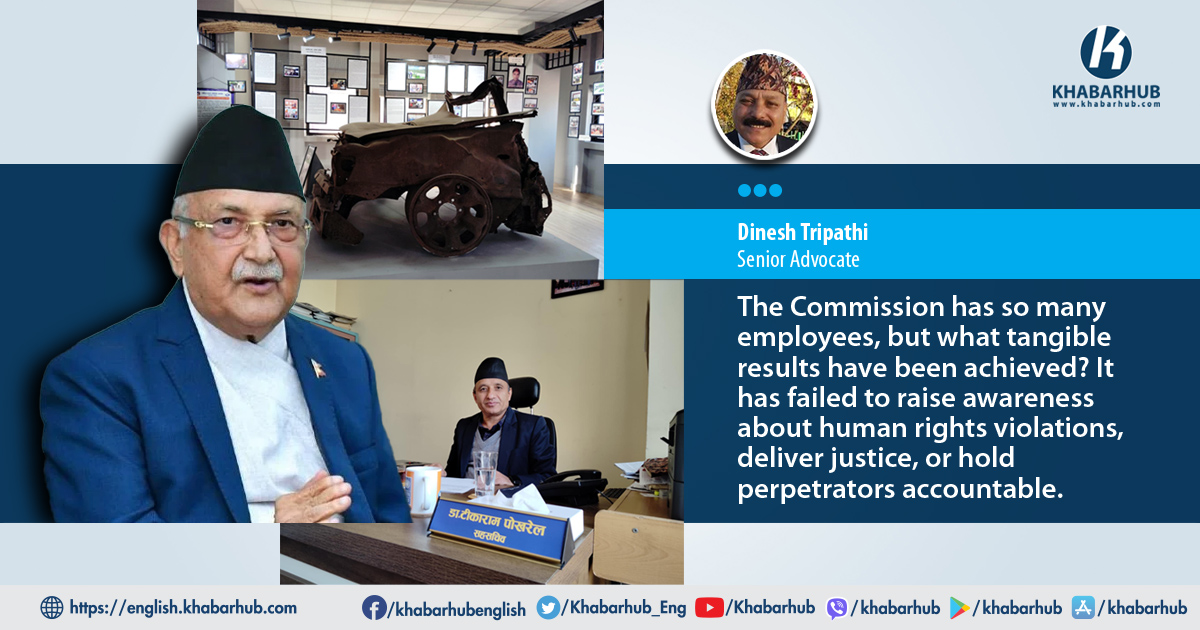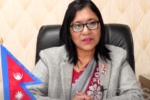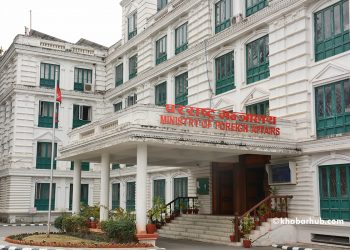KATHMANDU: It’s been six years since the tragic rape and murder of 13-year-old Nirmala Panta from Kanchanpur.
On 27 July, 2018, Nirmala, who had gone to visit a friend’s house, was found dead the next day in a sugarcane field by the Nimbukheda River in Bhimdatta Municipality.
Over this period, five Home Ministers have come and gone, and six investigation committees have been formed.
Yet, the killer remains unidentified. The Home administration’s response has been consistent: “The investigation is ongoing.”
Every Home Minister has promised that those responsible for Nirmala’s death will be identified and brought to justice.
When Rastriya Swatantra Party (RSP) President and former Home Minister Rabi Lamichhane took office, his first decision was to identify and take action against Nirmala’s murderer.
He even claimed that he was close to identifying the perpetrator, repeating this sentiment during his second tenure as home minister.
Nepali Congress (NC) leader Ramesh Lekhak has also been involved in the movement for justice for Nirmala.
“Frustration over delayed justice is natural. But the Commission, as a citizen’s organization, has certain standards and cannot exceed its mandate.”
On October 7, 2018, during a street protest, he alleged that the killer was being protected, and pointed out that the current home minister himself hailed from Kanchanpur, the same district as the victim.
According to the Nepal Police Central Office, 124 individuals have undergone DNA testing in connection with the case, and 655 people have been questioned.
The state has spent over 3.3 million rupees on the investigation. Nirmala’s parents, who desperately seek justice, remain skeptical that their daughter will ever see justice in a court of law.
Justice in shadows for 22 years
Ganesh Kumar Shrestha, a farmer from Ramechhap, was captured and executed by CPN Maoist rebels on November 22, 2002, while harvesting rice in his field.
For 22 years, his family, led by his sister Sabitri, has fought relentlessly for justice.
The government has repeatedly pressured them for reconciliation, but the family insists that no reconciliation is possible in cases of murder.
Unable to stay in their village due to constant threats, the family filed a complaint with the National Human Rights Commission (NHRC) on October 13, 2009, citing financial hardship, loss of livelihood, and the deteriorating health of the mother.
Disaster caused by caste discrimination
On November 8, 2017, a 22-year-old man and his 21-year-old wife, both from Nawalparasi, were subjected to horrific abuse due to caste-based discrimination.
The woman, who had married according to Muslim tradition, was forcibly held captive by her mother, who tricked her into coming home under the guise of a meeting.
The woman was forced to undergo an abortion, leading to severe bleeding.
Unable to endure the abuse, she attempted to escape, only to be tied up and imprisoned again.
Her family tried to marry her off to another man against her will. On March 5, 2018, the police intervened and rescued her.
These cases are just a few examples of the persistent human rights violations in Nepal.
Despite significant political and civil movements fighting for human rights, many Nepalis continue to struggle for even their most basic rights.
Struggle for justice amidst a system in crisis
Nepal fought long and hard to end the Rana regime and the autocratic monarchy, establishing democracy and ensuring constitutional protections for all citizens. Yet, despite these advancements, many citizens continue to face injustices, and the rule of law remains weak.
Human dignity is increasingly disregarded, and violations of human rights are widespread.
Women, particularly in rural areas, are still persecuted on charges of witchcraft, and children are often left without proper protection.
Minority communities, including the disabled, third-gender individuals, women, marginalized groups, and children, all continue to struggle for basic rights.
Impunity from the transition period after the armed conflict only exacerbates the problem.
It has been 24 years since the establishment of the NHRC in Nepal, but citizens still find it difficult to guarantee the realization of their rights.
NHRC: Politicized and ineffective
The NHRC, despite its constitutional mandate, has failed to effectively carry out its duties, largely due to politicization.
In December 15, 2020, Prime Minister KP Sharma Oli appointed the NHRC officials through an ordinance under the ‘Constitutional Council Act,’ further undermining its credibility both domestically and internationally.
The appointments were made without a public hearing, and the recommendation for the commission’s leadership was only submitted to the Parliament Secretariat after the dissolution of the House of Representatives in December 2020.
Tap Bahadur Magar, a former Supreme Court judge, was appointed as the chairman, and Surya Prasad Dhungel, Mihir Thakur, Manoj Duwadi, and Lily Thapa were appointed as members.
The United Nations questioned the appointment process, stating that the NHRC’s functioning violated the Paris Principles, which set the international standards for human rights commissions.
The United Nations Office for Human Rights (OHCHR) raised concerns about the lack of transparency in the appointment process and its potential impact on the NHRC’s credibility.
As a result, the UN Subcommittee on Accreditation (SCA) recommended downgrading the NHRC’s status to “B,” and the Global Alliance of National Human Rights Institutions sent multiple warning letters to Nepal.
Despite ongoing correspondence between the NHRC and the UN, the latter remains unconvinced about the legitimacy of the commission’s appointment process and its ability to operate independently.
Commission denies imminent downgrade
Dr. Tikaram Pokharel, spokesperson and joint secretary of the National Human Rights Commission (NHRC), has stated that despite receiving three warnings, the Commission’s rank is not in danger of downgrading.
He emphasized that many countries, including those in the “B” category, continue to function effectively in human rights work.
“It is a matter of pride that Nepal is currently in the ‘A’ category. We have sent responses to the questions raised by international bodies. Therefore, we are not in a state of downgrading,” he said.
The warnings issued by the Global Alliance of National Human Rights Institutions highlighted three main concerns:
The Appointment of Commissioners – There were issues regarding the transparency and independence of the appointment process.
Marginalized Communities – It was noted that the rights of marginalized groups have not been prioritized, and the National Human Rights Act is not sufficiently human rights-friendly.
Autonomy and Independence – The Commission was criticized for a lack of autonomy, with allegations that state interference undermines its independence.
Pokharel defended the Commission’s actions, particularly regarding the appointment process, which he said is currently under legal review.
“The Commission’s decision on appointments is valid, as it is a matter currently in court. It is not that the Commission has failed to make recommendations—over 1,500 complaints have been addressed, and actions have been recommended against 400 individuals. Additionally, the Commission has pushed for compensation of Rs. 280 million,” he explained.
However, he acknowledged that only 38 percent of these recommendations have been implemented.
“With 62 percent of recommendations still pending, it may appear as though the Commission is not committed to its work. However, the implementation of these recommendations is the responsibility of the government, not the Commission,”
Pokharel noted. “The lack of action from the government has left victims with no recourse but to complain.”
Pokharel further stated that those who fail to understand why justice has not been delivered often blame the Commission.
“Justice is not being denied because of the Commission’s ineffectiveness. The duties and rights of the Commission must be understood in context. The Commission also faces limitations in terms of manpower and resources. It is not simply a body that reacts to complaints but also takes proactive steps to locate victims and bring them justice.”
He dismissed allegations that the Commission was politically influenced, asserting that the employees in question were appointed through legal and procedural means.
“Can people who come to work solely for career advancement truly serve the cause of human rights? The Commission has so many employees, but what tangible results have been achieved? It has failed to raise awareness about human rights violations, deliver justice, or hold perpetrators accountable,” he stated.
“These are just false allegations made by political party officials. If you ask those who make these accusations, they cannot provide evidence to support their claims. It is easy to blame the Commission based on hearsay, but such accusations are baseless,” Pokharel said.
“Frustration over delayed justice is natural. But the Commission, as a citizen’s organization, has certain standards and cannot exceed its mandate,” he added.
According to Pokharel, since its establishment in 2057, the Commission has investigated over 12,000 complaints, of which more than 1,500 have resulted in recommendations.
Senior Advocate Tripathi critiques NHRC’s effectiveness
Senior Advocate Dinesh Tripathi, however, has raised concrns about the NHRC’s credibility, suggesting that the threat of downgrading is already a significant blow to its reputation.
“International organizations respect court decisions. Currently, the Commission is still in the ‘A’ category, awaiting the court’s decision. But we are not in a secure position,” Tripathi remarked.
He pointed to the Paris Principles, which stress that human rights commissions should be independent, impartial, transparent, and autonomous.
“The Nepal government made appointments to the Commission in an opaque manner, violating constitutional provisions. This has severely damaged the Commission’s dignity and reputation,” he said.
“If these appointments are not corrected, Nepal’s rank could indeed be downgraded.”
Tripathi argued that such a downgrade would severely harm Nepal’s international standing.
“Human rights organizations have placed Nepal under observation, warning that the Commission could be downgraded to a ‘B’ category. People committed to human rights should be appointed to such positions,” he added.
Experts, meanwhile, agree that achieving true human rights requires more than just legal equality, especially in a context where violence and discrimination continue to plague society.
He further criticized the government’s handling of the situation. “The government does not seem to understand the long-term damage caused by this. Amrit does not grow from a poisonous tree. The appointments are prima facie unconstitutional, and the Supreme Court is currently reviewing them,” Tripathi said.
“Three letters warning of downgrading morally lowers the Commission’s standing. While the court’s decision is awaited, the Commission’s future status remains uncertain.”
Tripathi also accused the Commission of becoming a place for political appointments rather than a body focused on human rights.
“Can people who come to work solely for career advancement truly serve the cause of human rights? The Commission has so many employees, but what tangible results have been achieved? It has failed to raise awareness about human rights violations, deliver justice, or hold perpetrators accountable,” he stated.
Tripathi argued that individuals with established reputations in the field of human rights should be appointed to the NHRC.
“People of repute, with high moral character, should be in the Commission,” Tripathi emphasized.
“Officials appointed by political parties are often not morally responsible and lack the necessary ideals to uphold human rights effectively.”
On 16 December 2020, Tripathi filed a writ petition in the Supreme Court challenging the constitutionality of the ordinance that led to the appointment of the current NHRC officials.
He argues that the ordinance is inconsistent with the Constitution and undermines the credibility of the Commission.
Experts, meanwhile, agree that achieving true human rights requires more than just legal equality, especially in a context where violence and discrimination continue to plague society.
They argue that human rights cannot be fully realized without addressing fundamental needs such as education, healthcare, nutrition, and security.
“Human rights education must go hand-in-hand with practical measures to ensure access to basic services,” one expert noted.
“Teaching humanity, equality, and justice to the next generation is crucial, but it is equally important to provide them with the means to live with dignity and security.”









Comment